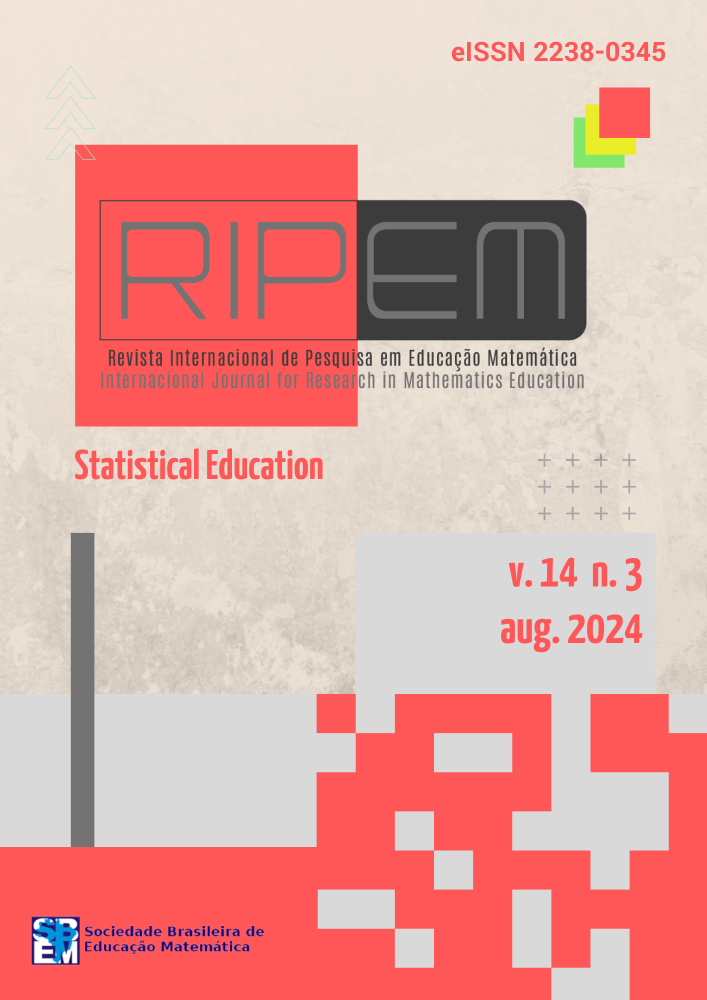Being, seeing and recognizing oneself as a teacher who teaches Mathematics: (re)configuring Professional Identities from the perspective of Probabilistic Education
DOI:
https://doi.org/10.37001/ripem.v14i3.3831Palavras-chave:
Professional Identity, Probabilistic Education, Teachers who Teach Mathematics, Research-TrainingResumo
This article aims to understand how actions and practices based on studies on Probability Education contribute to the (re)configuration’s movement of the Professional Identity (PI) of Teachers who Teach Mathematics (TTM). The study is based on a qualitative and interpretative paradigm, relied on a Research-Training path developed in a study group with 11 TTM. To this end, we are based on a characterization of TTM’s PI, which points out a set of elements (macrodomains) that allow us to understand them in their ways of being, seeing and recognizing themselves as such. The results and discussion were based on the apprehension of four Meaning Cores, which indicate that the TTM’s PI were forged from the Learning Paths (re)constituted in the collective/collaborative context of the group and interwoven by elements of personal, emotional, moral and sociopolitical nature that emerged from the enterprise of teaching and learning Probability.
Downloads
Referências
Aguiar, W. M. J.; Aranha, E. M. G. & Soares, J. R. (2021). Núcleos de significação: análise dialética das significações produzidas em grupo. Cadernos de Pesquisa, 51, 1-16.
Alves-Mazotti, A. J. (2001). Relevância e aplicabilidade da pesquisa em educação. Cadernos de Pesquisa, 113, 39-50.
Batanero, C. & Alvarez Arroyo, R. (2023). Teaching and learning of probability. ZDM Mathematics Education, 56, 5-17.
Batanero, C. (2005). Significados de la probabilidad en la educación secundaria. Revista Latinoamericana de Investigacion en Matemática Educativa, 8(3), 247-263.
Carvalho, J. I. F. (2017). Um estudo sobre os conhecimentos didáticos-matemáticos de probabilidade com professores de Matemática dos Anos Finais do Ensino Fundamental. 344f. Tese (Doutorado em Educação Matemática). Universidade Anhanguera de São Paulo. São Paulo, SP.
Clandinin, D. J. & Connelly, F. M. (2015). Pesquisa Narrativa: Experiência e História em Pesquisa Qualitativa (2. ed.). Uberlândia, MG: EdUFU.
Cyrino, M. C. C. T. (2017). Identidade profissional de (futuros) professores que ensinam Matemática. Perspectivas da Educação Matemática, 10, 699-712.
Cyrino, M. C. C. T. (2018). Grupos de estudo e pesquisa e o movimento de constituição da Identidade profissional de professores que ensinam matemática e de investigadores. Revista de Ensino de Ciências e Matemática, 9, 1-17.
Cyrino, M. C. C. T. (2021). Ações de Formação de Professores de Matemática e o Movimento de Construção de sua Identidade Profissional. Perspectivas da Educação Matemática, 14(35), 1-26.
De Paula, E. F. & Cyrino, M. C. C. T. (2020). Aspectos a serem considerados em investigações a respeito do movimento de constituição da Identidade Profissional de professores que ensinam matemática. Educação, 45, 1-29.
Estrada, A. & Batanero, C. (2015). Construcción de una escala de actitudes hacia la Probabilidad y su enseñanza para profesores. In: C. Fernández; M. Molina & N. Planas (Ed.). Investigación en Educación Matemática XIX (pp. 239-247). Alicante: SEIEM.
Fernandes, F. S. & Miarka, R. Educar pela probabilidade: um ensaio sobre possíveis educabilidades junto aos pensamentos de Nietzsche e Deleuze. Quadrante, 24(1), 81-102.
Gal, I. (2005). Towards “probability literacy” for all citizens: building blocks and instructional dilemmas. In: G. A. Jones (Ed.). Exploring probability in school: Challenges for teaching and learning. (pp. 43-71). New York: Springer.
Gal, I. (2023, 18 de agosto). Desenvolvendo letramento estatístico: Direções de ensino e pesquisa. [Live no Youtube]. [Mediação e Tradução Leandro Souza]. Brasil. Vídeo. Disponível: https://www.youtube.com/watch?v=tCVDCatWGzo.
Graven, M. & Heyd Metzuyanim, E. (2019). Mathematics identity research: the state of the art and future directions. ZDM Mathematics Education, 51, 361-377.
Josso, M. C. (2007). A transformação de si a partir da narração de histórias de vida. Educação, 3(63), 413-438.
Kelchtermans, G. (2005). Teachers’ emotions in educational reforms: Self-understanding, vulnerable commitment and micropolitical literacy. Teaching and Teacher Education, 21(8), 995-1006.
Lasky, S. (2005). A sociocultural approach to understanding teacher identity, agency and professional vulnerability in a context of secondary school reform. Teaching and Teacher Education, 21, 899-916.
Levy, L. F.; Manfredo, E. C. G. & Gonçalves, T. O. (2012). Concepções sobre Identidade do Professor de Matemática: Portugal e Países Francófonos. Unión, 31, 65-74.
Lopes, C. E.; Ribeiro, R. M.; Pazuch, V. & Augusto, A. F. C. (2022). A coparticipação em um projeto interdisciplinar e a agência profissional docente: narrativas da professora Adriana. Revista Eletrônica de Educação Matemática, 17, 1-21.
Nacarato, A. M. & Grando, R. C. (2015). A análise de aulas videogravadas como prática de formação de professores que ensinam Matemática. In: A. B. Powel (Ed.). Métodos de pesquisa em Educação Matemática usando escrita, vídeo e internet (pp. 61-94). Campinas, SP: Mercado de Letras.
Oliveira, H. M. & Cyrino, M. C. C. T. (2011). A formação inicial de professores de Matemática em Portugal e no Brasil: narrativas de vulnerabilidade e agência. Interacções, 7, 104-130.
Oliveira, L. M. & Cyrino, M. C. C. T. (2022). Aspectos da prática de uma comunidade de professoras de matemática e o desenvolvimento da agência profissional. Quadrante, 31(1), 7-27.
Shulman, L. (1987). Knowledge an teaching: foundations of the new reform. Harvard Educational Review, 51(1), 1-22.
Silva, A. R. S. (2023). Probabilidade subjetiva no ensino médio: constituição de indicadores epistêmicos e o conhecimento dos estudantes. 117f. Dissertação (Mestrado em Educação Matemática e Tecnológica). Universidade Federal de Pernambuco. Recife, PE.
Skott, J. (2018). Re-centring the individual in participatory accounts of professional identity. In: G. Kaiser, H. Forgasz, M. Graven, A. Kuzniak, E. Simmt & B. Xu. (Ed.). Invited lectures from the 13th International Congress on Mathematical Education (pp. 601-618). Cham: Springer.
Thompson, A. G. (1992). Teachers’ beliefs and conceptions: A synthesis of the research. In: D. A. Grouws (Ed.). Handbook of research on mathematics teaching and learning (pp. 127-146). New York: Macmillan.
Wenger, E. (1998). Communities of practice: Learning, meaning and identity. Cambridge: Cambridge University Press.
Publicado
Como Citar
Edição
Seção

Este trabalho está licensiado sob uma licença Creative Commons Attribution-NonCommercial-ShareAlike 4.0 International License.








